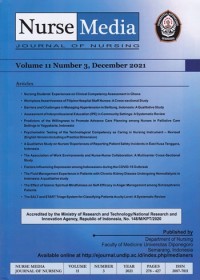
Jurnal
Nursing Students’ Experiences on Clinical Competency Assessment in Ghana
Background: More countries are establishing licensing examination systems for nursing education, including clinical competency assessment. In Ghana, clinical competency assessment forms part of the nursing licensing examination and is perceived as the benchmark for nursing licensing examination in the sub-region. The nationalised assessment system is established with some ad hoc changes over the last decade which requires continual evaluation. It is essential to find out how students experience this assessment system.
Purpose: This study aimed to explore nursing students’ experiences of the clinical competency assessment in Ghana.
Methods: An exploratory descriptive qualitative design was used in this study. Eight focus group discussions (FGDs) were conducted with 68 final year students purposively selected from eight nursing education programs. The FGDs lasted between 90 to 120 minutes. Content analysis was used to analyze the data.
Results: Although the pre-examination conference between students and examiners helped lessen students’ anxiety, limited resources, incongruence in teaching, practice and assessment, inherent biases due to the unstandardised assessment system, and a financial burden compromised the quality of the assessment.
Conclusion:Clinical competency assessment is central to nursing licensing examinations; hence the ability of the system to discriminate competent and incompetent nurses otherwise cannot be overemphasised. Standardisation, training of the examiners and continuous evaluation of the assessment system are imperative for quality improvement in clinical competency assessment.
Availability
No copy data
Detail Information
- Series Title
-
Nurse Media Journal of Nursing, Vol. 11 No. 3 December 2021
- Call Number
-
(05) 610.5 DEP n
- Publisher
- Semarang : Department of Nursing, Faculty of Medicine Diponegoro University., 2021
- Collation
-
Hlm. 278-293
- Language
-
English
- ISBN/ISSN
-
2087-7811
- Classification
-
(05) 610.5 DEP n
- Content Type
-
-
- Media Type
-
-
- Carrier Type
-
-
- Edition
-
Vol. 11 No. 3 December 2021
- Subject(s)
- Specific Detail Info
-
-
- Statement of Responsibility
-
-
Other version/related
No other version available
File Attachment
Comments
You must be logged in to post a comment
 Computer Science, Information & General Works
Computer Science, Information & General Works  Philosophy & Psychology
Philosophy & Psychology  Religion
Religion  Social Sciences
Social Sciences  Language
Language  Pure Science
Pure Science  Applied Sciences
Applied Sciences  Art & Recreation
Art & Recreation  Literature
Literature  History & Geography
History & Geography